Mak-RIF, CAES Open Day: VC Reveals Plan to Establish a University-wide Research & Innovations Incubation Centre

The Guest of Honour, PS MAAIF, Maj. Gen. David Kasura Kyomukama (2nd R) and the Vice Chancellor, Prof. Barnabas Nawangwe (3rd R) with the Principal CAES-Prof. Bernard Bashaasha (3rd L) and Deputy Principal CAES-Dr. Gorettie Nabanoga (R), researchers and other officials at the Mak-RIF CAES Open Day on 14th December 2021, Makerere University.
Plans are underway to establish a University-wide Research and Innovations Incubation Centre. This was revealed by the Vice Chancellor, Prof. Barnabas Nawangwe during the College of Agricultural and Environmental Sciences (CAES) Open Day held on 14th December 2021 to showcase outputs of some of the research projects supported by the Government of Uganda through the Makerere University Research and Innovations Fund (Mak-RIF). The event was presided over by the Permanent Secretary, Ministry of Agriculture, Animal Industry and Fisheries (MAAIF), Maj. Gen. David Kasura Kyomukama. It was attended by, among others, the representative of the Chair Grant Management Committee, Assoc. Prof. Isa Kabenge; stakeholders in the agricultural sector; the Principal, CAES, Prof. Bernard Bashaasha; the Deputy Principal, Dr.Gorettie Nsubuga Nabanoga; members of the Mak-RIF Secretariat led by Ms. Phoebe Kamya Lutaaya; and members of staff and students of Makerere University.
Touring the exhibition stalls, the Vice Chancellor said Management was fast-tracking the formation of a university-wide Research and Innovations Incubation Centre to support researchers to improve their prototypes. “The projects we have seen today are very impressive.It is gratifying to note that our researchers are actively working with communities to address various challenges. This is clear testimony that we are on the right track as a University. I take this opportunity to congratulate all researchers for the great innovations,” he said.
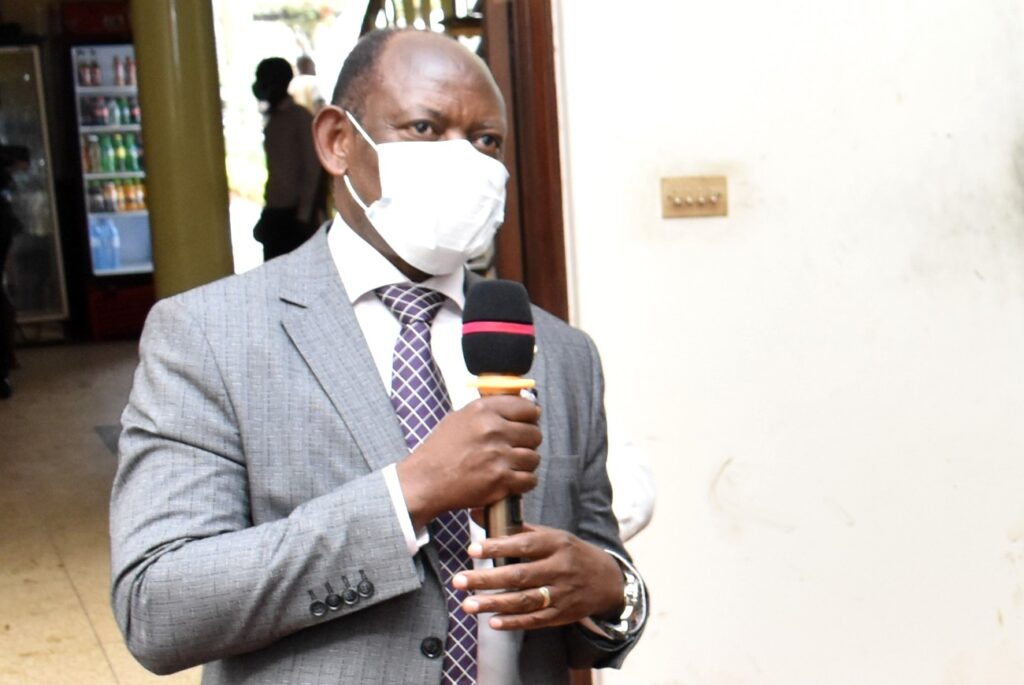
Emphasizing the critical role played by universities in the development of nation states, the Vice Chancellor said Makerere had reached a stage of churning out companies that can transform the country’s economy in the shortest time possible. “Through the Research and Innovations Incubation Centre, this can be achieved. It is our responsibility to ensure our country remains stable by creating employment for multitudes of young people, and enhancing food security. I therefore appeal to the government to support the establishment of the centre.”
The Vice Chancellor reminded the researchers of the need to patent their work. He also advised them to work towards commercialising their products. He expressed gratitude to the Government of Uganda for the continued support towards research and innovations at Makerere University. He also appreciated the University Grant Management Committee for negotiating the support and ensuring it is put to good use. The Vice Chancellor commended the Mak-RIF Secretariat for working tirelessly to ensure the research conducted does not remain on the shelves but is widely disseminated to foster uptake and economic transformation.
During the event, researchers from CAES showcased outputs of various projects including;
- Unlocking the commercial potential of Canariumschweinfurthi (Empafu) indigenous fruits for improved livelihood in Central Uganda – Prof. Jacob Agea. The main objective of the project was to develop high value commercial innovations from the fruit. Specific objectives were to formulate high value wine and jam innovations from the fruit pulp and to assess consumer market acceptability for developed wine and jam innovation.
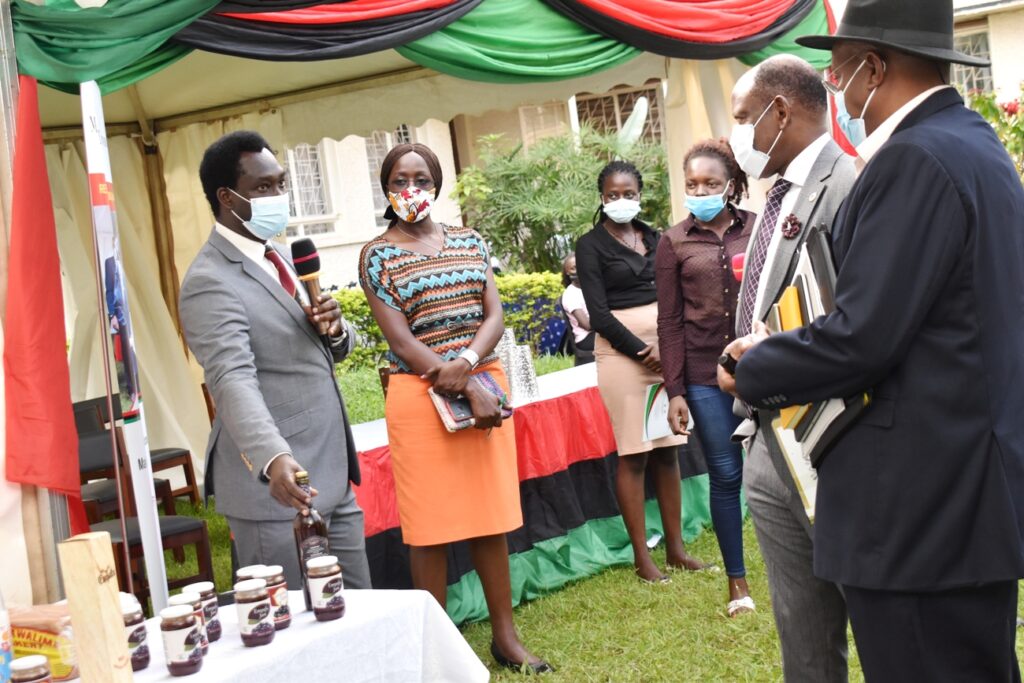
- Design, construction and evaluation of an automated continuous pasteurizer –Dr Emmanuel Baidhe, Dr Julia Kigozi. Along the juice processing chain, thermal processing by pasteurization is considered to be the most crucial of all unit operations as it increases the shelf life of the juice. Several batch pasteurizers have been locally developed and adopted. However, with the batch system, a particular volume of product is processed per unit time. It is therefore very cumbersome for a processor with large volumes since they have to keep emptying and refilling the vat. It requires a lot of resources in terms of labour (Amit et al., 2017), time and energy to have large quantities of juice processed. The purpose of the study was to design, simulate, construct and assess the performance of the low-viscous juice continuous pasteurizer.
- Enhancing Value addition on Potato-Sorghum enterprises for Improved Livelihoods in Uganda (EVaPoSIL) -Prof. Johnny Mugisha. Potato (Solanumtuberlosum) and sorghum (Sorghum bicolar) are potential pathways for enhancing household incomes, food and nutrition security in South-western Uganda which is characterized by land scarcity, decreasing agricultural productivity, high post-harvest losses and low per-capita income. Potato and sorghum are the region’s main enterprises but their economic and nutrition potential are not fully exploited. Sorghum productivity and profitability are very low and potato harvest losses in form of non-marketable tubers are high. The project sought to enhance the value of both crops by innovative value addition that makes them complements, reduce harvest losses, increase incomes, and make available to consumers a diversity of high quality products. The overall objective was to improve the economic value of potato and sorghum enterprises for improved livelihoods of the value chain actors.
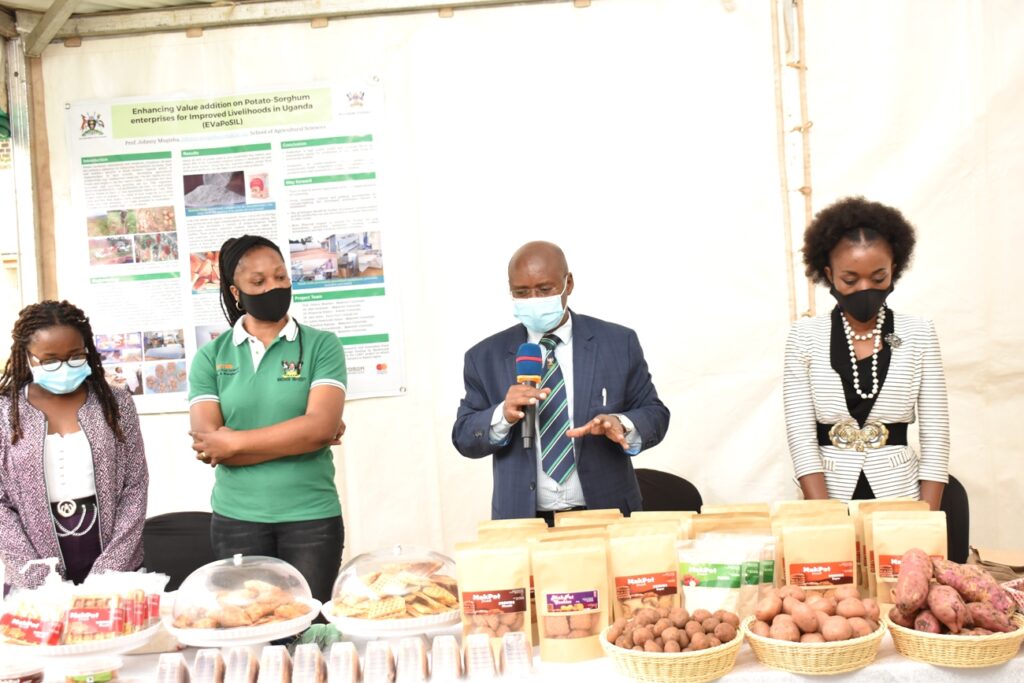
- Developing dry season feeding technologies for different cattle production systems in Uganda – Dr Justine Nambi-Kasozi. Scarcity, high cost and fluctuating quality of feeds are major constraints to sustainable cattle production in Uganda, particularly during the dry seasons. Use of crop residues plays an important role in reducing feed stress. However, most crop residues are bulky and low in nutrient content hence unable to support maintenance and production requirements of cattle. The objective of this project was to develop crop residue-based multi-nutrient blocks (MNB) and pellets to increase the intake and utilization of crop residues for dry season feeding.
- Digitalizing the Makerere University Soil Test Kit for rapid soil assessment, improved soil management, crop yields and incomes among farmers in Uganda – Emmanuel Opolot. Accurate assessment of soil is key for its sustainable use and management. The Makerere University Soil Test Kit (MAK-STK) comes in handy. It gives results of five soil parameters (pH, N, P, K and SOM) within minutes. However, the results from the MAK-STK are qualitative and thus hard for agricultural extension workers to advise farmers on how much nutrients to add to the soil. The project objectives were to (i) calibrate the MAK-STK with laboratory data for major soil types in Uganda, (ii) develop a digital platform through which the MAK-STK results can be quickly and easily translated to fertilizer recommendations and (iii) build capacity of the agricultural extension officers, farmers and fertilizer input dealers on the use of the Makerere University Soil Test Kit and its digital platform.
- Development of a Safe and Efficacious Anti-malarial drug from Traditional medicine -Prof. John Tabuti. Malaria is still a leading source of illness and death. In 2017, about 219 million suffered from malaria worldwide, with 92% of cases occurring in Africa. Malaria management is complicated by the fact that access is still limited in some places, and there is a possibility of treatment resistance.The goal of this research was to contribute to the development of a safe and efficacious anti-malarial. The specific objectives were: to compile a list of malaria treatment plants in Tororo District and prioritize them to determine the safety of the malaria treating plants.
- Deployment of the new Maksoy soybean varieties for on-farm income enhancement, Food and Nutrition security, Enterprise Development and Job creation in Eastern Uganda – Prof. Phinehas Tukamuhabwa. Over the last 10 years, Makerere University developed six improved soybean varieties namely MAKSOY 1N, 2N, 3N, 4N, 5N and 6N. Unfortunately, the potential of the new MAKSOY soybean varieties had not been fully exploited due to limited farmer access to seed in addition to low skill set in soybean agronomic practices that subsequently leads to low yields. Further, each of the soybean varieties has specific attributes for protein, oil, maturity and yield in the field and efforts had been made to enhance their adoption in different parts of Uganda. However, the role of soybean in contributing to food and nutrition security of different households and communities in the country remains a critical challenge. This project focused on harnessing the value of the different soybean varieties through value addition using soymilk and soy flour for adoption by households, SMEs and also to set up a Soy Processing Unit at MUARIK.
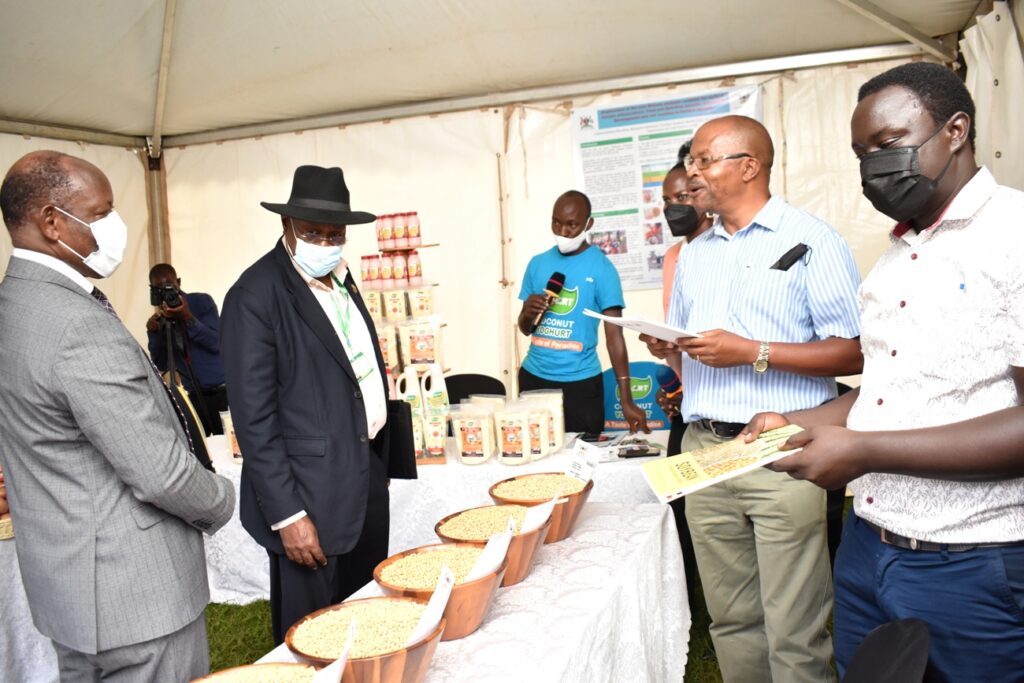
- Improving access to biodiversity data for conservation decision making: A case of the National Biodiversity Data Bank, Makerere University, Uganda – Daniel Waiswa. This project sought to revitalize the NBDB as a one-stop biodiversity data centre enabling easy and fast access for sound biodiversity conservation decision making. The overall objective was to improve access to biodiversity data for conservation decision making while the specific objectives were to: increase stakeholders’ engagement and confidence in the NBDB for enhanced biodiversity data sharing and access, re-designing and operationalizing the NBDB Database for reception, storage and open access to data and enhancing and sustaining the staffing, capacity and infrastructure of the NBDB.
- A Pedal-Operated Seed Cleaner (PoS-Cleaner) To Boost Post Harvest Grain & Legume Quality, Increase School-Study time & Create Financial Freedom in Rural-Uganda – Peter Tumutegyereize. Sub-Saharan Africa (SSA) annually registers 40-50% of food Post-Harvest Losses (PHLs) worth US$4 billion with 41% and 26% respectively grains & legume losses in Uganda. Maize grains lost alone, could feed over 1.14 million persons for a full year. These losses along the food chain are greatly attributed to poor seed sorting or cleaning. Unclean seeds and foreign materials promote mold development resulting to dry matter loss, nutritional changes, seed quality loss, aflatoxin contamination and PHLs during storage and processing. Despite this, majority of small-scale farmers have no access to appropriate seed cleaning technologies. The available imported seed cleaners in Uganda are energy and cost demanding in terms of ownership, operation and maintenance. Farmers depend on traditional screening or winnowing which is inefficient, time consuming, labour intensive and dust exposure resulting into ill health. For rural schools that depend on in-kind food tuition contributions from parents, students traditionally clean seeds hence reducing their study time and educational performance. The study sought to create intermediate but appropriate post-harvest cleaning technologies.
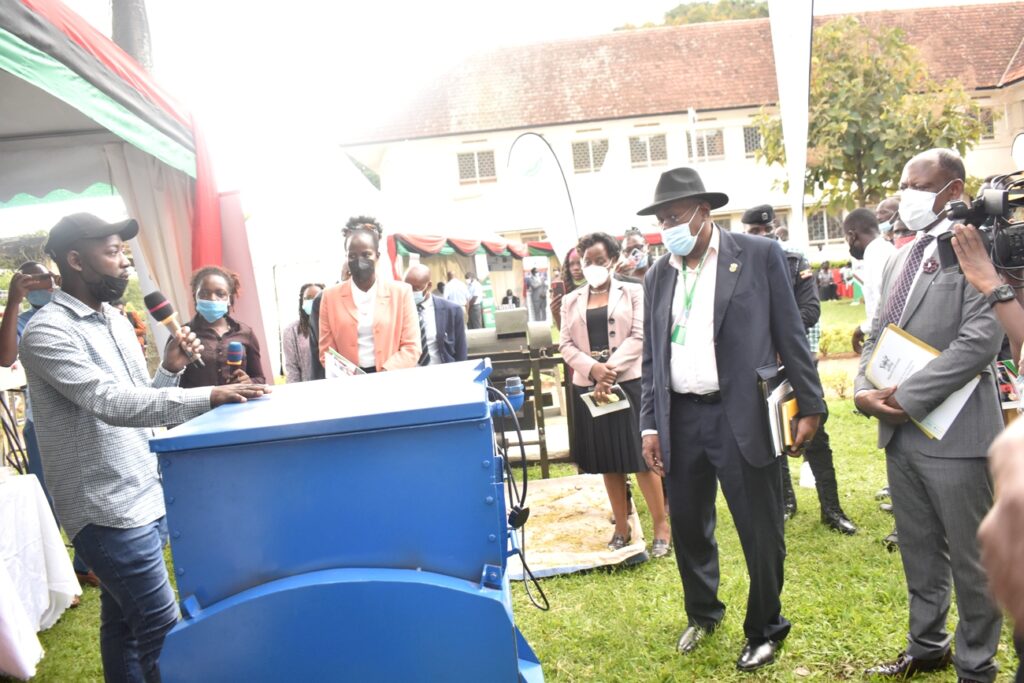
- Developing an automatically controlled commercial solar-dryer and efficient resource recovery innovations for sustained market responsive fruit production in Uganda -Ahamada Zziwa. Food insecurity and poor livelihoods continue to prevail in Uganda partly due to high post-harvest losses, limited value addition options and low farm-gate prices particularly for perishable foods (FAO, WFP and IFAD, 2019). The lack of affordable preservation options contributes to over 30% post-harvest losses because majority of farmers have no access to electricity for processing and preserving perishable foods. Harnessing solar energy and its use for food preservation is a viable option for most off-grid farmers. However, the existing solar dryer designs are limited in drying efficiency due to absence of temperature and relative humidity controls which undermines their ability to ensure consistent physical and nutritional quality of dried products. Most dryers are also small drying capacity designs based on only solar light as the drying power which renders them unsuitable for large scale drying and uneconomical (Shaikh and Kolekar, 2015). The project aimed to: 1)design, construct, test and promote a sensor-controlled dual heat source (Hybrid) solar dryer to ensure consistent drying of reasonably large volumes of perishable produce; 2) investigate vermicompost recovery from pineapple waste and cow dung; and 3) optimise biogas production from pineapple waste.
- Development of Nutrient-Dense Recipes and Products from Underutilized Crops to Alleviate Malnutrition among HIV/AIDS Infected Persons in Western Uganda – Agnes Nabubuya. Human Immunodeficiency Virus (HIV) is a global pandemic that is currently affecting 3.7 million people worldwide of which 70% is found in Sub-Saharan Africa. Uganda continues to suffer from scourge of HIV with current prevalence at 7%. Healthcare of people living with HIV/AIDS (PLWHA) in Uganda is constrained by poor nutrition, with estimates of 25% suffering from malnutrition. This project addressed the challenge of malnutrition in PLWHA by using underutilized crops through development of nutrient-dense recipes and products. The research team analysed the nutritional composition of identified underutilized crops and developed nutrient-dense recipes and products for PLWHA.
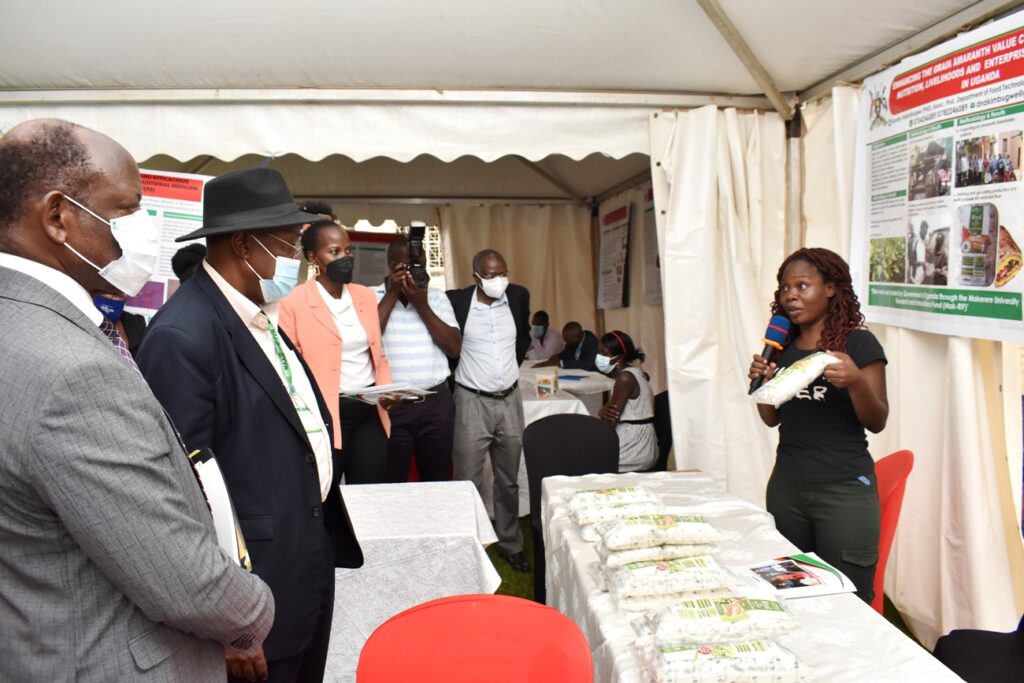
- Strengthening the resilience and visibility of peri-urban poultry farmers in Wakiso for better marketing and profitability through feeding, post-harvest handling, value addition and resources recovery – Ahamada Zziwa. Globally, COVID-19 has had adverse impacts on the poultry value chain through infecting workers, farmers, stalling production, disrupting the supply chain, and thus affecting product demand. The lockdown led to socioeconomic restrictions and distortions in community dynamics, marketing and sale of products leading to huge losses in the poultry sector (FAO, 2020; Poudel et al., 2020). Transport restrictions to poultry farmers and closure of national borders, weekly markets, institutions, schools, hotels and restaurants, which were the main markets, left farmers with large quantities of unsold poultry products, resulting in financial losses especially to farmers without value-addition options and resources recovery innovations. The overall objective of the project was to strengthen the resilience and visibility of peri-urban poultry farmers for sustained poultry production, better marketing and enhanced profitability through innovative feeding, post-harvest handling, value addition and resources recovery.
- Optimized software for planning and simulation of food aid response during the COVID-19 pandemic and other similar disasters in Uganda – Fildah Ayaa. Covid-19 was declared a pandemic on 11th March 2020. First lockdown measures to contain the spread of the virus effected on 31st March 2020. Covid-19 lockdown disrupted food supply systems, causing food insecurity, especially in urban areas.Uganda’s government food distribution efforts were frustrated by poor planning for both food stock and manpower. Only 12 % of the total population received food aid during lockdown period. Of these, 24% were urban residents and only 7% lived in rural areas (Acayo,2020). The research team designed software for authorities to plan for food distribution during and after the Covid-19 pandemic in Uganda.
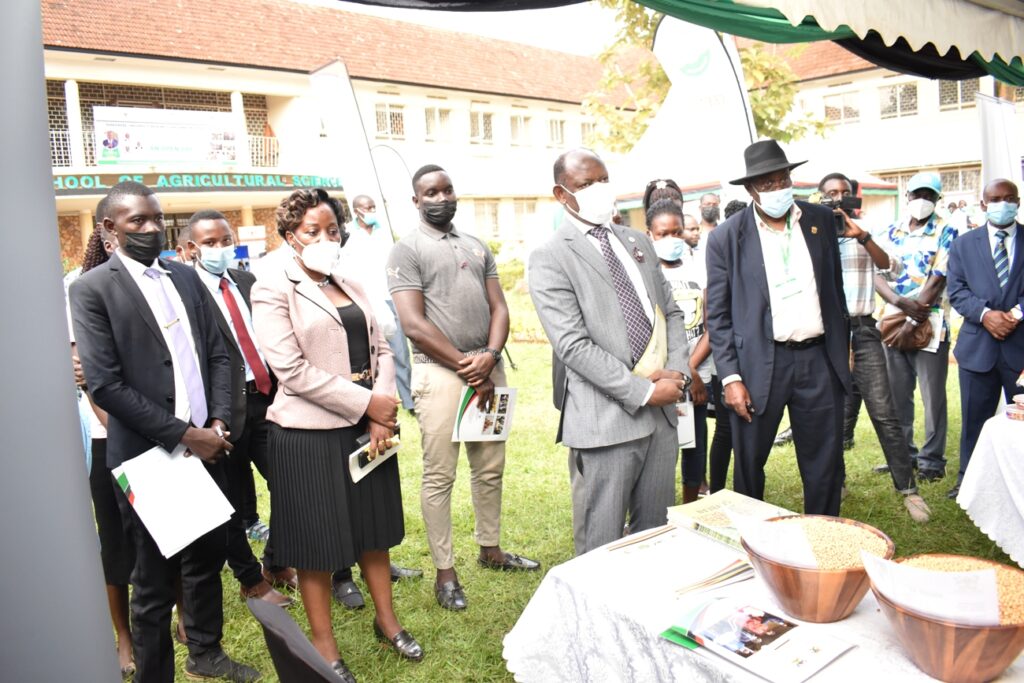
- Development of a Green Low Cost Touchless Handwash Technology (TW-20 Kit) For Public Shared Spaces – Joshua Wanyama. Effective hand washing with soap for at least 20 seconds and limiting contacts are useful COVID19 preventive measures. However; the existing point-of-hand washing systems are ineffective in achieving the set measures as most of them require individuals to touch the units, have no mechanism in place to ensure hand washing with soap for the recommended time and are therefore prospective contagion points for the pandemic (WHO 2020). There was therefore, a need to develop a low-cost hand washing technology that automatically releases soap detergent without contact and allows users to rub and scrub the hands with soap for 20 seconds before water is released for rinsing. The project aimed to provide a safe water and hygienic technology to boost behavioural hand washing culture and reduce the risk of SARS-COV-2 human to human transmission in public shared spaces. The specific objectives were: i) to re-evaluate and modify the first prototype of TW-20 Kit V1.1 design customized for public settings, ii) to influence public behavioural change towards hand hygiene and product validation by undertaking a comprehensive pilot study in selected shared public spaces in Kampala Metropolitan Area.
- Design and development of an atomized spray drier for egg powder production for use in bakery industries of Uganda – Kivumbi Hussein Balimunsi. Due to the introduction of fast growing breeds of chicken in Uganda, there has been enormous production of high quality eggs, making the country one of the largest egg producers in the region. However, due to the outbreak of COVID19 and the subsequent lockdowns, the prices of eggs drastically reduced to nearly 5000 UGX per tray consequently affecting chicken farmers. This was further worsened by the lack of value addition to the available eggs leading to huge losses. This project sought to explore the utilization of spray drying in the production of high-value products from eggs in Uganda as a measure to minimize losses.
- Automation of communal hand water pumps to eliminate COVID-19 transmission – Nicholas Kiggundu.The research was motivated by the observation that alternative solutions of limiting the spread of COVID-19 such as washing hands with water and soap or use of chemical sanitizers are difficult to enforce especially in the low income rural and peri-urban communities where the boreholes are found. The researchers invented MAKNAI an acronym for the Makerere University – MAK NAyIkondo – vernacular for borehole, a prototype to automate cranking of the hand pump that draws water from a well. Designed by a team from the Department of Agricultural and Biosystems Engineering (DABE), School of Food Technology, Nutrition and Bioengineering (SFTNB), College of Agricultural and Environmental Sciences (CAES) the prototype consists of a PV (photovoltaic) panel, battery, solar charge controller, inverter, motor, pulleys, belt, reciprocating arm and a foot switch. The foot switch serves to replace the use of palms and fingers to crank the pump handle, as is the practice while drawing water at boreholes.
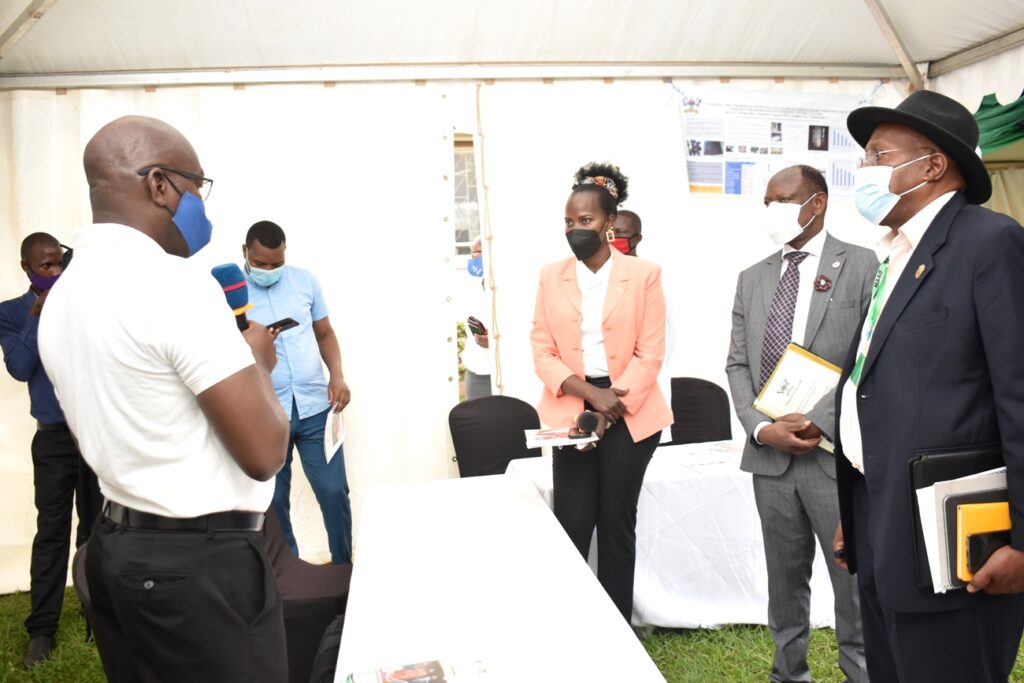
- Empowerment of the Agro-Processing Industry to meet the Quantity and Quality Standards for the Local and Export Market; a Programme Enhancing the Practical Skills of Students in Makerere University – Julia Kigozi.
- Mountain Gorilla Tourism Re-examined: Implications of increased visitor numbers to the welfare and behaviour of mountain gorillas in Bwindi Impenetrable National Park, Uganda – Prof. David Mwesigye Tumusiime.
- Developing Biofertiliser Formulations to Unlock Crop Productivity for Improved Food Security and Household Livelihood in Uganda – John Baptist Tumuhairwe
Remarks by the Permanent Secretary, MAAIF (Guest of Honour)
Addressing participants, the Permanent Secretary, Ministry of Agriculture, Animal Industry and Fisheries, Maj. Gen. David KasuraKyomukama commended the innovations at CAES and Makerere University in general. He applauded Makerere University Management and Council for creating an enabling environment for research and innovations. Maj. General Kasura appreciated the Government of Uganda for the enormous investment in research at Makerere and other Institutions of Higher Learning.“With guidance from the President of the Republic of Uganda, H.E Yoweri Kaguta Tibuhaburwa Museveni, the Government has invested heavily in research, one of the major drivers of economic development. The Government has supported the formation of various initiatives aimed at advancing research in the country. In particular, the Government has supported the creation of several research initiatives at Makerere University. This is highly commendable and a great stride towards transforming our economy,” he noted. He appealed to the researchers to invent more technologies to aid the production of quality agricultural products in the country. “We should always ensure our agricultural products are 100% free of aflatoxinto avoid reputational damage,” he advised. Maj. Gen. Kasura pledged support towards the commercialization of the research outputs. He urged the researchers to extensively disseminate their work, saying that knowledge that is not shared is useless.
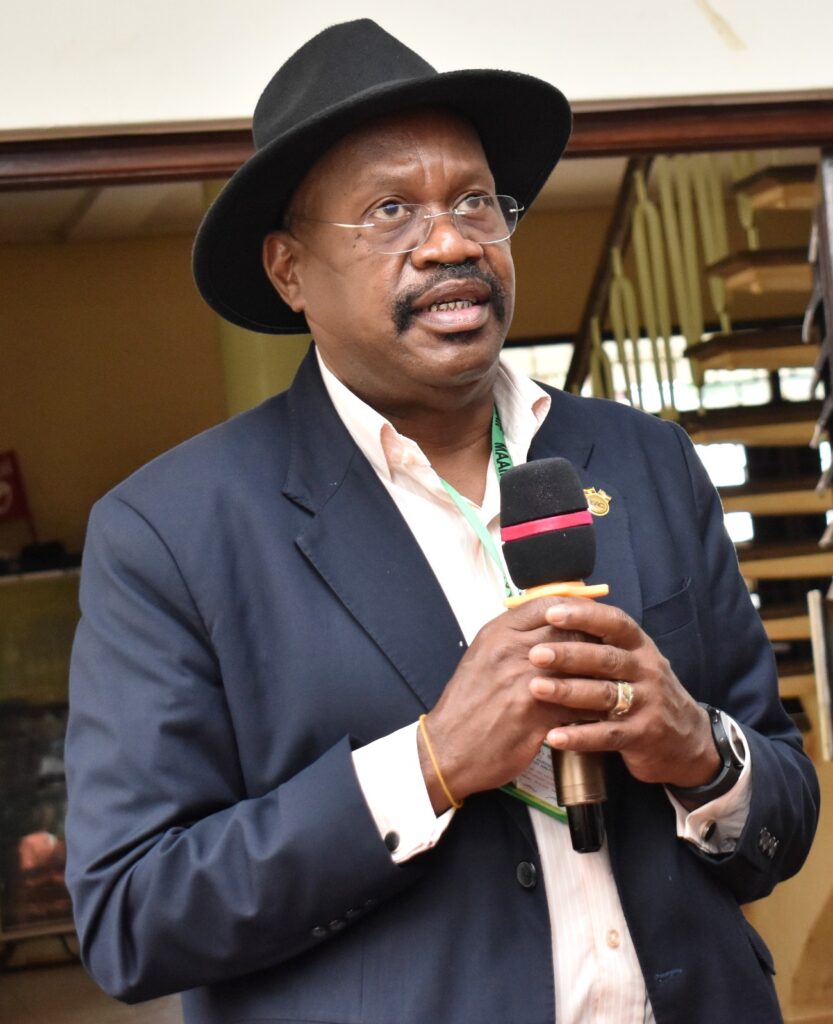
The representative of the Chair, Makerere University Grant Management Committee, Prof. Isa Kabenge expressed gratitude for the support rendered by the Government, noting that the impact of the research projects is invaluable. Since Financial Year 2019/20, the Government through Mak-RIF has supported 711 multidisciplinary research and innovation projects across the 10 colleges of Makerere University. The College of Agricultural and Environmental Sciences (CAES) has obtained 79 projects across the three financial years.
In his remarks, the Principal, CAES, Prof. Bernard Bashaasha applauded the researchers for the great initiatives. He extended appreciation to Makerere University Management, the Government of Uganda, and development partners for supporting the researchers to explore their full potential. “The research generated at the College is highly commendable and has played a critical role in shaping the national and global policies,” he said.
Similarly, the Deputy Principal appreciated the researchers, CAES Management, the University Management, Government and development partners for the support that has enabled the college to generate productive research.
About Mak-RIF
The Makerere University Research and Innovations Fund (Mak-RIF) is a funding stream to support generation and translation of high impact research and innovations to drive Uganda’s development Agenda. This initiative is funded by the Government of the Republic of Uganda.
Objectives of the Fund
- Developing and funding a robust research agenda based on National development priorities identified from academia, government, implementing partners, and industries.
- Supporting the dissemination of high-quality research and innovations in a way that impacts development policies and programs.
- Supporting the growth of research leadership capacity in the university.



